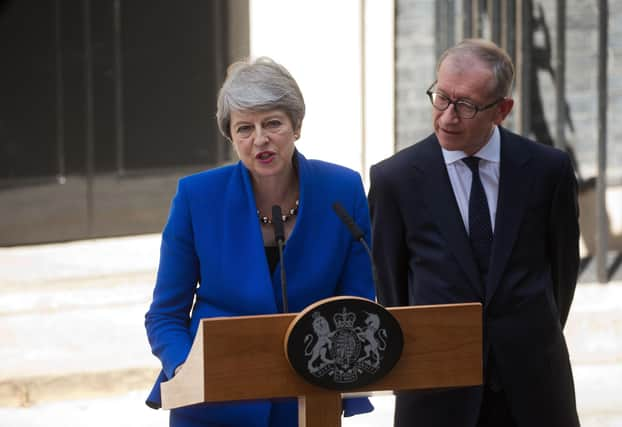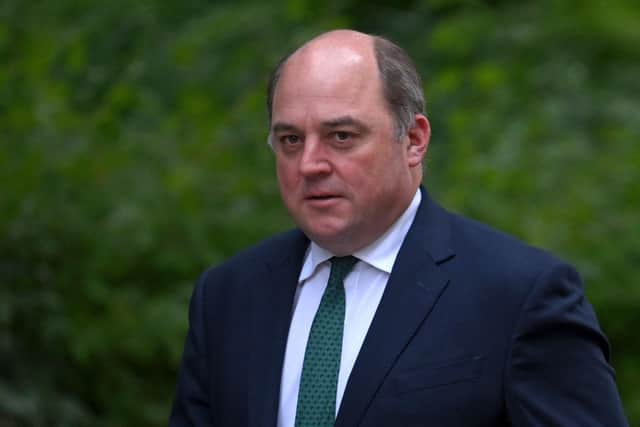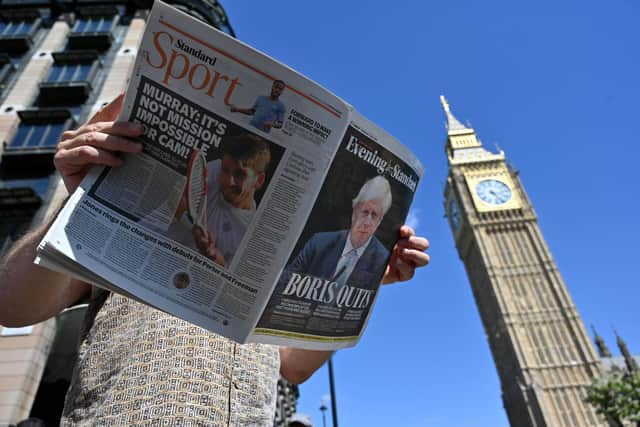Dani Garavelli: How do we start to rebuild trust in our politics


The timing, she avowed, was accidental; nor had she altered her text in light of unfolding events. And yet it could not have been more apposite. There she was in the Institute of Government talking about how trust in politicians had been destroyed. And there he was - less than a mile away - showcasing exactly those political flaws she put at the heart of the rot. All that was missing was a live link and a telescopic pointer.
May’s lecture was being delivered in memory of former government minister James Brokenshire who died last year from lung cancer at the age of 53. She said Brokenshire had all those traits that made a decent politician. He was a good constituency MP. He respected parliament and understood the scrutiny it provides. And he knew ministers had to get to grips with the issues; it wasn’t good enough to wing it. “[James] exemplified decency, honesty and integrity - values I believe are essential in public life if we are to have faith in our politics,” May said
Advertisement
Hide AdAdvertisement
Hide AdSpoken as a tribute, these comments were also barbs aimed at a man who neglected his constituency, disrespected parliament and never did anything but wing it. Johnson’s speech was - as she must have anticipated - entitled and graceless: a fitting end to an entitled and graceless career. Where May’s resignation speech ended with an expression of gratitude for the opportunity “to serve the country she [loved]”, he demonstrated neither contrition nor humility. Rather he presented himself as a man deprived of his birthright by those too small to appreciate his greatness. “The herd instinct is powerful,” he said. “And when the herd moves, it moves.”


Johnson has never seen himself as a public servant; it has always been about his own self-aggrandisement. And while the “character” he created - his bumbling, man-of-the-people schtick - made him popular for a while, the culture in which he flourished and which he fed was always going to corrode trust in himself, his party and in wider politics.
May outlined the extent to which the electorate’s faith in their representatives has been damaged. She said a recent YouGov poll showed 63% of people believe politicians are in it for themselves, with just 5% believing they are in it for the interests of their country.
She went on to highlight the importance of playing by the rules. “It’s not unreasonable to expect those of us who write the law of the land to follow its letter and spirit,” she said - an allusion to the parties held during the Covid restrictions. “We cannot claim as a country to operate in line with the rule of law if we flagrantly abuse our own obligations under treaties we have signed,” she said - an allusion to the government’s policies on Rwanda and the Northern Irish protocol. “Playing by the rules also means not changing them on a whim, to suit personal interest,” she said in an explicit reference to the government’s attempt, last November, to change the rules on parliamentary standards to help Owen Paterson avoid a 30-day suspension for breaching lobbying rules - a move May said kick-started an unhappy period for the party.
You can, of course, quibble with the former Prime Minister's remarks, or at least seek to contextualise them. The culture of entitlement in the Conservatives did not begin with Johnson, it began with Cameron - another old Etonian who held the EU referendum at least in part as a sop to his public school friends. His Tory colleagues knew Johnson was dangerous and promoted him anyway (lest we forget, it was May who appointed him Foreign Secretary). They then elected him leader to “Get Brexit Done'' without thought for the long-term repercussions. Those who resigned last week were defending him right up until he was caught lying about serial sexual harasser Chris Pincher (and some of them continue to do so). The toxicity of the party will not be neutralised simply by chopping off the basilisk's head.


Still, May’s speech raised important questions. What impact has Johnson's tenure had on public trust in the political system? And what, if anything can be done to restore it?
*********
Lack of trust in politicians is not a new thing; even in 1944, when the war-torn country appeared to be rallying behind the government, 35% of the population thought politicians were in it for themselves.
Mark Diffley, researcher, pollster and director of the Diffley Partnership, says that pattern continued through the decades. In the last 40 years, trust in politicians has never risen above 25%, dropping even lower during times of crisis/sandal. During the 2009 expenses scandal, it fell to 10%
Advertisement
Hide AdAdvertisement
Hide AdPoliticians fare poorly compared with other professions, even bankers and estate agents. And the hostility extends beyond the profession to the structure. “Last year we did some research where we looked at trust in institutions,” Diffley says. “The score for the political system was 3.6 compared with 7.4 for the NHS.”
Some argue this entrenched disaffection fostered the populism of Donald Trump and Johnson.
“What we have seen is this kind of slow erosion of trust from Iraq to the expense scandals to [PartyGate],” says Eddie Barnes, campaign director of Gordon Brown’s Our Scottish Future, which was set up to push for “a better Scotland in a changed Britain”. “Politics simply hasn’t worked for people,” Barnes said. “Then the crash comes along and it stops doing the job it is supposed to do, which is to pass on a better future to the next generation."
At first many people (and therefore his party) didn’t much care about Johnson’s lack of integrity. Despite his frequent and blatant lying, he won a resounding majority in the 2019 General Election, suggesting voters were prepared to tolerate his mendacity so long as they believed he would do their bidding.
It was only during Partygate that the mood palpably shifted. As it became clear Johnson and others had been living it up even as so many people were mourning the loss of their loved ones remotely, the hostility towards his style of politics grew even amongst his former supporters.
“Brexit poisoned the well; it created a dividing line,” says Barnes, who also used to be Ruth Davidson's spin doctor. “After the referendum, the Tory party jumped on [the Leave] side of that dividing line. It decided to go for this Faustian pact with Johnson, so he could reach the parts other politicians couldn’t reach. And that worked in 2019, but it also demonstrated the limits of his populist approach. Like everyone else, I have been dismayed to witness his lack of seriousness; to see him turn that great office of state into a laughing stock.”
Peter Geoghegan, editor-in-chief of independent global media platform openDemocracy, says there is a growing sense politicians aren’t pursuing power out of a desire to serve, but because they regard it as their rightful destiny. “Johnson epitomises that," he says. "You could see it in his resignation speech where he talked about this perfect Darwinian system that would replace him. He was saying: ‘I deserved [to become Prime Minister].’
“The Conservative governments over the last few years, under Cameron, under Johnson, have epitomised this. There’s a Bullingdon Club mentality: very male, very white, very privileged. I don’t think any politician has been sanctioned as much as Johnson.” Earlier this year, openDemocracy ran a piece headlined 18 Times Boris Johnson Broke the Rules and Got Away With It. They included arranging £126,000 of taxpayers’ money in grants for his former lover, Jennifer Arcuri and restarting his lucrative Telegraph column just three days after resigning as Foreign Secretary. “The rules are always for someone else, so it’s no surprise public trust has been eroded,” Geoghegan says.
Advertisement
Hide AdAdvertisement
Hide AdHe points out this behaviour has repercussions beyond lowering trust in individual politicians, and says Johnson and Trump often used their own lack of integrity to damage others. “It makes the whole enterprise seem untrustworthy and they know how to play that [to their advantage]. It's the idea everyone is crooked, but at least you know where you stand with Johnson. He is saying: ‘Yes, maybe I’m in it for myself, but I am not a hypocrite.’ That can be a successful political tactic, but corrodes public trust and everything gets lumped in together, so [Starmer’s] curry [in the run-up to the Hartlepool by-election] becomes the same as Johnson’s parties and people stop talking about the by-election to ask questions like ‘when was the curry served?’ It’s ridiculous because it’s this versus a man who got a Tory donor to wallpaper his house.”
The perception that for MPs and journalists politics is a game may further erode confidence. That’s something the current crop Tories are guilty of, but it extends to other parties, too. On the night before Johnson resigned, SNP MP Alyn Smith smirked during an interview with Sky News and said: “I could be nakedly political and enjoy what's going on with the UK government right now because it's actually strengthening our case." From a political perspective you could see what he meant; Johnson’s undignified attempt to hold onto power may reap benefits for the SNP and the independence movement. But we are in the middle of a cost of living crisis; the stakes for ordinary people are high. Such glee highlights the gap between those pushed to the brink by the rise in prices and those who are not. “Politics has been a rolling theatre for six years," Geoghegan says, "and there’s a danger it will be a rolling theatre for another 10 years."
Other politicians lose trust by diluting their policies to fit in with what they believe the electorate will accept. Labour leader Keir Starmer presents himself as a serious man for serious times, but seems constrained by focus groups. We saw that most vividly in his refusal to take a moral stand against the Tories’ Rwanda policy and in his lack of support for the rail strikes. “Starmer bowed to the focus groups on the rail strikes, yet [RMT general secretary] Mick Lynch was able to win people over through his passion and force of argument,” a Labour source says. “What people want is for politicians to have real vision and sell that vision to them.”
This refusal to say anything that rocks the boat may be why non-politicians such as footballer Marcus Rashford, food campaigner Jack Monroe and financial campaigner Martin Lewis are so admired. Last week, there were calls for Lewis to stand as Prime Minister - an indication people believe he, at least, has the public’s interest at heart.
This suspicion of MPs’ motives is compounded by the fact nothing changes when wrongdoing is exposed. This time last year we were still mired in the Greensill scandal when it emerged Cameron had repeatedly lobbied Tory ministers through informal channels such as text and WhatsApp messages. He wanted Greensill to be allowed access to the government’s Covid loan support scheme. The Commons inquiry found no rules were broken, but only because the rules were too weak. It recommended they be strengthened. Yet nothing has been done.
“I had experience of this again last week,” Geoghegan says. “We pursued a long-running investigation into the Cabinet Office clearing house blocking FOI requests. An inquiry launched on the back of that investigation came back with hard-hitting recommendations, but now the government has published its response and has rejected pretty much all of them. We have these moments when there’s a fulmination around something and then we move on. Later, it becomes a scandal again and the next time people are even more pissed off and they lose even more trust.”
***********
As I write, Johnson continues to bring his party and the political system into disrepute, clinging on as caretaker, appointing remaining loyalists - MPs like Peter Bone and Andrea Jenkyns, last seen giving the finger to Downing Street crowds - as ministers.
Diffley is convinced public trust will continue to be affected. “I think the narrative that this stuff doesn’t matter and all that counts is talking about the economy is wrong,” he says. “People do care about it. There is a risk you’ll see levels of trust plummet further, but more importantly there is a risk levels of engagement - such as turn-out at elections - will fall.” Diffley says this is self-perpetuating: the less people engage, the less likelihood the situation will change and the more they become disaffected.”
Advertisement
Hide AdAdvertisement
Hide AdSo what can be done? Do any of Conservative leadership contenders have what it takes to steady the ship and bring back integrity to the party?
Current favourite Rishi Sunak has put the attempt at the forefront of his campaign, choosing, “Let’s Restore Trust, Rebuild the Economy and Reunite the Country” as his slogan.
Barnes believes politicians should be more honest about the limits of government, and says Sunak was good at this in the wake of the pandemic. “Sunak said: ‘This cost of living thing is so big I can’t do it all.' That’s the way to [approach things]. It’s not to stand up like Johnson and say: ‘I’m going to fix everything, you can have lower taxes and high spending and global Britain and it’s going to be fantastic' because that just pisses everyone off. Be frank and open with people; don’t treat them like idiots.”
On the other hand, Sunak’s attempt to present himself as the ethical choice seems foolhardy given he too was fined for breaking lockdown rules and the questions over his wife’s tax status. (His pledge to rebuild the economy is also bizarre given, as Chancellor, he was in charge of it for the last three years).
The second favourite (at the time of writing) is Defence Secretary Ben Wallace. His advocates point out he is amongst the least tainted by Johnson (he couldn’t realistically resign because he was in charge of the country’s security). They say that, as a former MSP, he understands devolution; that, having served with the Scots Guards in Northern Ireland, he understands the sensitivities around the protocol; and that, as a former Remainer, he has the potential to unite the party. Meanwhile, his detractors highlight his voting record (he has been consistently pro for cutting benefits and corporation tax, and against equal marriage), Wallace was also one of four Tory “landlord” ministers to have claimed expenses to cover their rent while letting out properties in London.
In any case, Barnes believes it will take more than a new man or woman at the helm. The Tories and other parties must come up with detailed programmes of government. “The worst thing anyone could do right now is to stand up and say: ‘Trust me, I will deliver’. People have had enough of performative politicians beating their chest. And you can’t have woolly visions any more. It’s about having measured, realistic, detailed plans on how you take the country forward with a focus on supporting the most vulnerable and the weakest in society. You could argue that’s boring, but we need that grinding, boots on the ground work. You can’t win back trust overnight."
There's a need for structural change, too. “I think taking money out of politics would go a long way,” Geoghegan says. “That’s a huge part of where mistrust comes from - political donors buying access to power. You could limit political donations to £10,000, you could bring in a proper lobbying register, you could introduce a proper Ministerial Code in place of this bizarre independent ethics adviser who can only launch an investigation if the Prime Minister says so. If you changed all that, it would help.”
Of course, the SNP would argue the current system is irreparably broken; that the only way to restore trust in politics is for Scotland to break away and strike out on her own. Opponents would counter this by pointing out that some of the failings of Westminster - centralisation, a lack of transparency, even the mishandling of sexual harassment claims - are currently being replicated at Holyrood.
Advertisement
Hide AdAdvertisement
Hide AdJohnson was an excellent recruiting sergeant for the SNP and the independence movement. Whether his departure helps or hinders the chances of a second IndyRef and a Yes vote depends on the calibre of his successor and what happens at the next General Election. Suella Braverman would make a better recruiting sergeant than Wallace, but neither of them are likely to grant a Section 30 order. And arguably a Labour government might dampen enthusiasm for constitutional change.
Our Scottish Future agrees Westminster must be reformed. “If you are going to restore trust you need to make people feel much more politically included,” Barnes says. “We might not support independence, but we need to listen to those who do support independence and accept they have a point. It’s the same point Andy Burnham makes in Manchester and Mark Drakeford makes in Wales: that we can’t have a Whitehall-knows-best system of government any more. It has to be something much more collegiate."
Right now, as Johnson and his allies continue to sully British politics, integrity and decency are in short supply and any prospect of rebuilding faith seems remote. Thanks to a public backlash, our caretaker Prime Minister has cancelled plans to Carrie on Cavorting with a lavish Chequers party at the taxpayers’ expense. But it will take much more than a shift of wedding celebration venue to undo the damage to British politics.
Ends